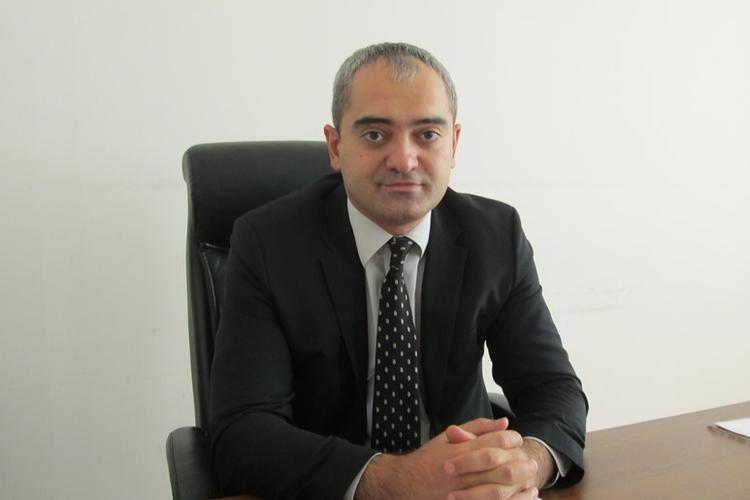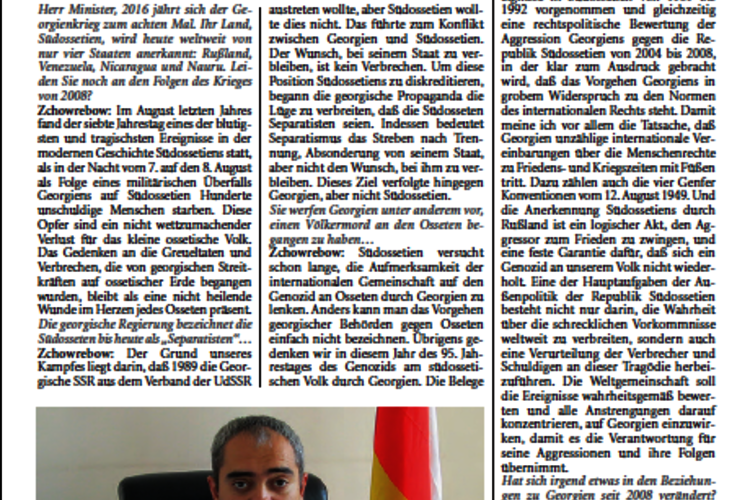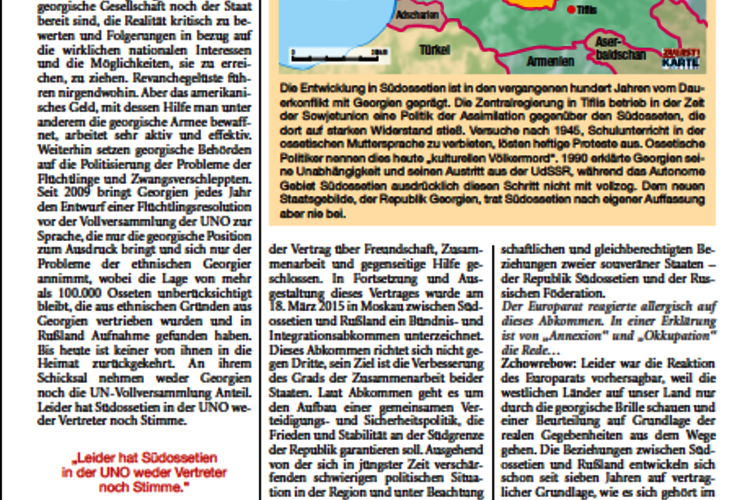- Honorable Minister, the 7th Anniversary of the notorious August affairs in South Ossetia, when you were attacked by Georgian army, has been commemorated this year. How do you see these affairs from current perspective?
- August 2015 saw the 7th Anniversary of one of the most bloody and tragic dates in modern history of South Ossetia when in the early hours of August 8, 2008 hundreds of guiltless people were killed as a result of a treacherous attack by Georgia upon South Ossetia. These casualties are an irreparable loss for the small-numbered Ossetian nation. Memory of the atrocities and crimes committed by Georgian troops at Ossetian land will remain an open sore in heart of each Ossetian. The feat of the defendants of Tskhinval, Ossetian and Russian peace-keepers, soldiers and officers of the Russian army, who defended people of South Ossetia of killing, will always be an object of pride and worship.
What strikes in modern conflicts eye is the fact that external forces play not the last role in their promotion. It’s precisely the interference of Western countries that made possible power shift in your country in 2000s which was followed by forced separation of Kosovo, which has never been supported by the Republic of South Ossetia. You may ask “Why not?” as unfortunately, due to misperception of events in South Ossetia, they consider us in Serbia the same separatists as the Albanians from Kosovo. However it is not true. There should be difference between separatism that is a crime and legal national liberation struggle. If there were no legal reasons to proclaim independence in Kosovo, the struggle of South Ossetia people that started in 1989, when the Soviet Union still existed, bases upon the full range of the USSR laws that were in power at that time.
The gist of our struggle was that the Georgian SSR wanted to withdraw from the USSR, and South Ossetia wanted to remain a part of the USSR. This fact became reason of the conflict between South Ossetia and Georgia. A desire to remain a part of state isn't a crime. To compromise the position of South Ossetia, Georgian propagandists started extending actively lie that people of South Ossetia were separatists. However separatism means the desire to separate, stand apart from your state, but not the desire to remain its part. This aim was pursued by Georgia, not by South Ossetia. Thus, the position of the Ossetians meets the position of the Serbians and not the one of the Albanians. By the way, there were Ossetian natives who actively fought in ranks of the Serbian armed groups. I don’t think it is a secret in Serbia.
Long ago have they started in South Ossetia attempts to draw attention of the international community to subject of the genocide organized by Georgia against the Ossetians, as it is impossible to characterize otherwise actions of Georgian authorities in relation to the Ossetians. By the way, we have been commemorating the 95th anniversary of the genocide of South Ossetia people this year. There are more than enough data on the genocide of the Ossetian people. Yet in April, 2006 the Parliament of the Republic of South Ossetia adopted “The Declaration on genocide of South Ossetia people in 1989-1992 years”. The political and legal assessment of the events of 1989-1992 in South Ossetia was given, as well as the assessment of Georgian aggression against the Republic of South Ossetia since 2004 till 2008, which clearly states that activity conducted by Georgia is in worse conflict with the international law, including humanitarian legislation, tramples on set of international conventions and declarations related to human rights during peacetime and wartime, including four Geneva conventions dated August 12, 1949. Forcing Georgia to peace was the least-evil solution made by the Russian Federation, and was aimed at curbing the aggressor and preventing genocide of South Ossetians. As for the recognition of South Ossetia by Russia, it was a logical end of the act of peace-enforcement and a firm guarantee of not repetition of our people genocide.
Today the Republic of South Ossetia is an independent state recognized by the international community. I suppose nobody in the world has any illusions after all committed crimes concerning the coexistence of South Ossetia with Georgia in one state.
We have no right to forget and forgive Georgia the committed crimes. One of the primary goals of South Ossetian foreign policy is not only to inform the international community about those terrible events, but also to compel criminals responsible for that tragedy to be condemned. The international community has to give a legal assessment to these events and concentrate efforts on influencing Georgia to recognize responsibility for the aggression and it results. Suppression of the truth about those events and passive feedback of the international community on the aggressive policy pursued by Georgia would allow this state again and again commit crimes. Such serious crimes that get under definition of “crimes against humanity” mustn't remain unpunished. It is important for all people in the world that there were no more tragedies, similar to August 2008.
- Has anything in the relations with Georgia changed over time? What policy is pursued by the new President of Georgia in comparison with the policy pursued by Mikheil Saakashvili, the former President?
- Statement by the new Georgian authorities that they would like to improve the relations with South Ossetia definitely is of declarative character. Similar declarations made by Georgian officials were sound earlier. Political course of the new Georgian authorities differs a little from the one of their predecessors. In practice, the official Tbilisi, as well as the majority of Georgian society, still doesn't want to recognize the developed realities and keeps on insisting on “termination of the Russian occupation regime on the part of Georgian territory”.
Alongside with this the new authorities of Georgia regularly accuse the previous government in general and Mr. Saakashvili in person of being guilty of what have happened. Each new Georgian leader blames its predecessor of all sins, trying to present himself in the best light. Years passed after the shameful failure of the aggression against South Ossetia showed that Georgian society and the state aren't ready to take the reality critically, to draw conclusions on true national interests and ways how to advocate them. Yearning for revenge didn't get to anywhere. And for this purpose the American money allocated for Georgia’s arming no doubt work actively and effectively.
By the way, the fact that Tbilisi hasn’t still agree to sign the legally binding document on non-use of force also confirms the inalterability of Georgia compelling attitude to South Ossetia and Abkhazia. This particular is what our delegates and delegates from Abkhazia and the Russian Federation have been trying to achieve throughout 33 rounds of the Geneva International Discussions on security and stability in Trasnscaucasia. It is important that we have guarantees of non-use of force from Georgia. It would allow creating prerequisites for trust building between the two states. And Georgia has been evading of solution of precisely this problem.
What is more, Georgian authorities proceed politicizing such an important issue as the problem of refugees and forced displaced persons. Annually since 2009 Georgia have been submitting at the UN General Assembly draft resolution on refugees that reflects only Georgia’s position, considers problems of only ethnic Georgians whiles more than hundred thousand Ossetians who were driven out from Georgia for ethnical reason and found shelter in the Russian Federation are out of attention. None of them have returned to his former place of residence, and for some reason their destinies remain out of Georgia’s and the UN General Assembly’s sight, where South Ossetia, unfortunately, is not represented and has no voice. And the ethnic Georgians who now are called refugees in an orderly way left the territory of South Ossetia several days prior to the August War 2008 thanks to the criminal policy pursued by Georgia. Therefore talks on this subject remain populist and politically engaged.
- March 2015 saw the historical Treaty on Alliance and Integration signed in Moscow by Leonid Tibilov and Vladimir Putin, Presidents of South Ossetia and Russia. Could you please be more explicit, what this agreement assumes and whether South Ossetia would be integrated completely or it would reserve some sovereignty?
- Cooperation with the Russian Federation was and has been the focal point of foreign policy pursued by the Republic of South Ossetia. After the Russian Federation recognized the Republic of South Ossetia on August 26, 2008 the Treaty of friendship, cooperation and mutual assistance was signed on September 17, 2008. To develop this document the Treaty on Alliance and Integration was signed between the two states on March 18, 2015 in Moscow. This agreement isn't aimed against third countries but pursues the objective to increase the integration level between our states. According to the Treaty, a joint defense and security area guaranteeing peace and stability at southern borders of the Republic would be created. Taking into consideration the harsh political situation developed in the region recently and current challenges we are facing, it is necessary for the Republic of South Ossetia to strengthen alliance with Russia, our main strategic partner. Moreover, the Treaty provides for cooperation in law-enforcement, customs, social and economic spheres.
The Republic of South Ossetia is an independent and recognized state and being guided by the interests of its citizens, defines independently the domestic and foreign policy and acts in legislative framework. Once again the treaty testifies the development of friendly, equal relations between two sovereign states – the Republic of South Ossetia and the Russian Federation.
- One of this agreement’s articles lays South Ossetia under obligation to coordinate its foreign policy with Russia. Could you explain how it would influence your work as the Minister of Foreign Affairs of South Ossetia?
- The mentioned clause of the treaty sounds a little differently: “The Parties pursue a coordinated foreign policy which assumes accommodating interests of the Parties in various spheres of cooperation” that doesn't mean unilateral coordination of foreign policy pursued by the Republic of South Ossetia with the Russian Federation. Actually, this clause is a continuation of the Memorandum on cooperation in foreign policy signed between the Ministries of Foreign Affairs of the Republic of South Ossetia and the Russian Federation on January 20, 2009 and in many respects coincides with it. According to this clause, the Parties pursue a coordinated foreign policy which assumes accommodating interests of the Parties. The MFA of Russia represents South Ossetia in third countries and international organizations, so that thanks to the support of Russian colleagues, South Ossetia systematically implements the strategy of foreign policy development, despite the isolation initiated by Georgia. South Ossetia Foreign Ministry is in permanent interaction with the Embassy of the Russian Federation in the Republic of South Ossetia. We can say that the support of Russian colleagues positively affect the work of the Ministry of Foreign Affairs of the Republic of South Ossetia.
- Once the agreement was signed by your country and the Russian Federation the Council of Europe accepted the document in which expressed its vision of a problem. How did the EU react at the agreement between South Ossetia and the Russian Federation?
-Unfortunately, the reaction of the Council of Europe was predictable as the western countries look at our country through the prism of Georgian positions, without drawing conclusions based on the existing realities. For 7 years already have the relations between the Republic of South Ossetia and the Russian Federation been under construction on a contractual basis as it is customary in interstate communication. Therefore the fact that representatives of the EU often use terms “annexation or “occupation” is incorrect form legal point of view and could be explained only by political interests. The Treaty was signed for ensuring the necessary security between the friendly and equal states.
- Ivica Daciс, the Minister of Foreign Affairs of the Republic of Serbia, and the Ministry of Foreign Affairs of Georgia made a statement about the necessity of restoration of the OSCE Mission in South Ossetia recently. Why did the OSCE suddenly attend to human rights in South Ossetia and how do you estimate the authority of this organization?
- The Republic of South Ossetia has never opposed international representatives being present at its territory and has confirmed numerous times the readiness for cooperation with international organizations that do not politicize their humanitarian activity and are ready to work in our state as in a sovereign state. The Republic of South Ossetia seeks for equal membership in the international community. We try to establish cooperation with individual states as well as international organizations. We remember well in South Ossetia the work of the OSCE. There was an office of the OSCE Mission to Georgia in Tskhinval till August 8, 2008. Members of the mission participated in dealing with the Ossetian-Georgian conflict. I suppose, it won’t be useless to remind that the OSCE observers being witnesses of how Georgia had been preparing to implementation of forceful scenario in former zone of South Ossetia- Georgian conflict, organized an early evacuation of the office staff and undertook neither anything to prevent bloodshed nor to inform properly the involved parties. Nevertheless, our department repeatedly confirmed readiness for conducting constructive dialogue with international organizations including the OSCE, but taking into consideration the changed realities.
- What can you say about the situation in Ukraine? What were this conflict’s reasons in your opinion, and what are your predictions for the conflict resolution and the future of Ukraine?
- There is no secret that not the last role in whipping up tensions in Ukraine was played by naked intervention of some high-ranking politicians from western countries and the USA, who interfered the internal affairs of sovereign Ukraine, pursuing the goal to turn the state in a place of their geopolitical games and to create conditions for redivision of the regional border. It is hard to predict now how long would the Ukrainian crisis last and what consequences it will have. I consider that the people of Ukraine should make a decision on their fate themselves. We will follow carefully the situation in Ukraine and would call on all political forces to stop violence and to return the situation to peace course.
- South Ossetian Diplomatic Mission was opened in the DPR in April. How do representatives of South Ossetia see the conflicts in Donbass?
- If we are speaking of Donbass, completely different processes took place there. In the conditions of deposing the government that had been elected in democratic way, the major positions were captured by extremely nationalist forces that were calling for murders of the Russian population. They don't hide that their heroes, their example to follow, are those persons who were closely cooperating with special departments of the Third Reich, and that they use actively nazi symbolics of those years. Beatings and homicides started. People of Donbass rose to protect their homes, their families. The Lugansk and Donetsk People’s Republics were proclaimed. One has to understand that it wasn’t the goal of Donbass residents in itself to separate from Ukraine. Mostly they are miners, peace toilers. For the time being they were far from big-time politics. However when forces impinging upon their routine appeared, when shelling that claimed lives of absolutely innocent people began, they were compelled to protect themselves. Each person and each nation has the right to protection. When peaceful referendum or peacefully expressed will of a nation are answered with bullets and shells, repressions, arrests, beatings and murders, it means the government is anti-national. It means the government is tyrannical and despotic, and the UN Charter advocates the right of revolution against tyranny and despotism. Kiev dropped an army against peaceful people. But an army can shoot at its own nation only once. And this shot makes it alien to these nation.
Our vision of the Donbass conflict future is as follows: fighting should be stopped as soon as possible, troops on both parties have to be taken away, and dialogue on comprehensive has to be started. We refuse to understand statements on the unwillingness of official Kiev to start negotiations with representatives of the people’s republics. First of all, it is necessary to think not of one’s political ambitions and whims but of lifesaving measures. It is necessary to possess state thinking. The time will show whether Kiev authorities possess it.


